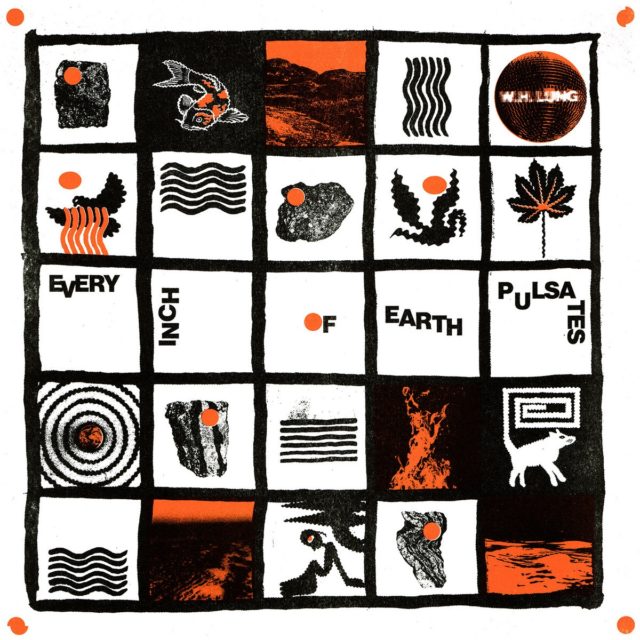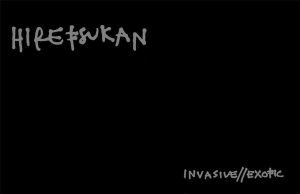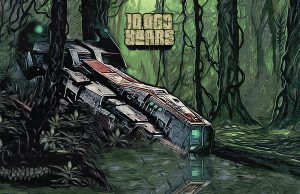THE EDITED PRESS RELEASE: “A huge thing for this record was to make it feel as close to our live show as possible,” says Tom Sharkett of W.H. Lung. “We didn’t want it to sound live but we wanted to capture the excitement of the live performances.”
This is something that has become paramount to the group in recent years as they have undeniably blossomed into one of the most joyous and arresting live bands in the country. “The reason I’m in a band is to play live music,” says singer Joe Evans. “For me, music is live music. That’s what it’s for, to be played with people.”
The five-piece band, also featuring Chris Mulligan, Hannah Peace and Alex Mercer-Main, decided to try something new on their third album after two incredibly successful collaborations with previous producer Matt Peel. In order to capture the energy, spirit and dynamism of their live shows, they relocated to Sheffield to work with Ross Orton (MIA, Arctic Monkeys, Working Men’s Club) who was able to harness this side of the band to remarkable effect. “Ross is the Sheffield Steve Albini,” says Evans. “He’s the king of not overthinking it and trusting the process of the art of recording songs. He was always there to stop us fucking around with cerebral stuff and get it down.” Sharkett echoes this too: “He was the exact producer we needed without us even realising. His productions and mixes are bombastic, lively and in your face and that’s exactly what we wanted.”

However, while this album is rooted in a sense of capturing a moment and a sparky liveness, that’s not to say it’s a raw or ragged record. It is still a meticulously composed, delicately layered and pristinely produced piece of work that, in true W.H. Lung style, runs the gauntlet from dance to pop to indie while still capturing that distinctly unique quality that is unquestionably their own. “It was a really big thing for me to realise what made us sound like us on this record,” says Sharkett. “I think the album sounds a lot more confident and self assured because of it. Some songs sound just so much like Lung and I’m really proud of that. I’m not sure we’ve done that as consistently across the other records.”
While the band have drilled deeper into finding their own singular identity, it’s not a record resting on its laurels. It’s a significant leap forward, expanding on their solid foundations while also breaking new ground. “The big difference with this record is its directness in every sense,” says Sharkett. “The songwriting is more upfront. Previously we’d focused a lot on vibe and production as opposed to just writing songs. The overall mission here was to revert to a classic songwriting structure and for the production to come afterwards.”
And so what you have on this record are deeply considered and well-crafted songs, then recorded with blistering intensity in the moment, and then given a touch of experimentation afterwards. Then throw in Orton’s contributions to the band and it’s proven to be a real winning formula. “He brought a real dose of magic to the songs we’d written,” says Sharkett. “And brought an extra bit of wonk and quirkiness each time.”

Such quirkiness is apparent from the opening Lilac Sky which very briefly samples a Learn To Speak Spanish 12” before whirring atmospherics, hypnotic bass, and shimmering synths began to propel the song for launch. “I like it when there’s really clear punctuation at the start of a record,” says Sharkett. “It’s almost like a statement of intent and I wanted something like that, where if people knew the tune they could identify it within the first second.”
It’s also the perfect album opener in more than one way, setting the tone for an album rooted in exploration. “I went out onto Hampstead Heath one day when it was dusk and the sky was mad and I’d just taken some mushrooms,” recalls Evans. “I was thinking: just remember this, this is how things really are. So maybe this track acts like an invocation or a calling for the rest of the album. It’s about listening closely, paying attention, and being overwhelmed with an open heart.”
On Bliss Bliss the band almost veer into anthemic indie territory, with its rousing chorus, euphoric lashes of synths and a vocal delivery that is festival headline worthy. “I sang it like I was singing a song I’d forgotten from when I was a teenager,” says Evans of his impassioned performance. It was a fresh approach for the band. “I thought the guitars felt too college rock at first but I just went with it,” says Sharkett. “It’s a completely different style of guitar playing for me and something much more traditional in the indie world but I was enjoying that.”
In many ways this was another foundational song for the LP. “This was the first instance of us writing more traditional songs for the album,” says Sharkett. “It kind of embodies our balance between being a live conventional guitar band and the shiny, synthy side of Lung to me. It feels like the perfect culmination of our experience as a band so far.”

The band’s ability to write more traditional and conventional songs is clearly a skill they’ve taken to with ease, at times there’s an almost Bruce Springsteen-like quality — but if he’d ever had an ecstasy period — to tracks such as Thinner Wine and Bloom and Fade. While How to Walk was constructed with one thing only in mind: that it would absolutely slay on stage. “I can’t wait to play this live,” says Evans. “We wanted a song to represent our live set, a new big one, and this is it.” Once again it leans towards the anthemic, with its driving, propulsive charge complete with incandescent synths and vocal melodies so irresistible you can already hear them being sung in unison by a crowd.
It’s an incredibly difficult feat to pull off a record that is more rooted in traditional songcraft while also capturing the power of a live performance, as well as pushing sonics into experimental new directions while working with a brand new collaborator. But here the band has managed to do just that.
And the album’s closing song I Will Set Fire To The House is a perfect example of such a thing. It’s a song that feels immaculately constructed but also very much alive and of the moment as its radiating synths engulf from the off, and Evans’ vocal is silky but powerful and in perfect symbiosis with Peace’s. It’s a song that captures the endless joys of music playing long into the night. “It may be a bit of a bloody bombastic way to end an album saying ‘and we’ll dance into the sunrise’,” says Evans. “But fuck it.”








































